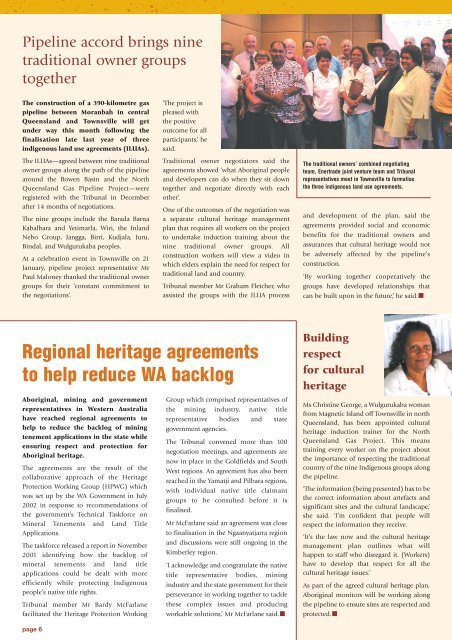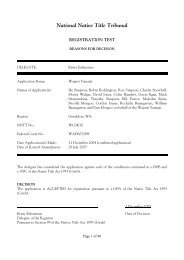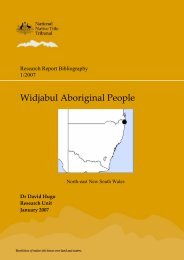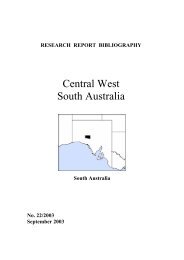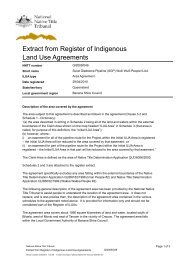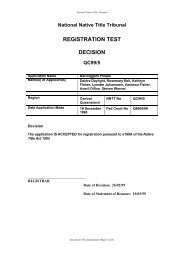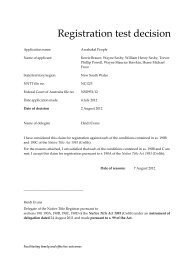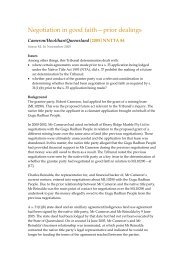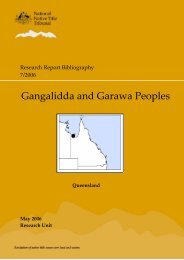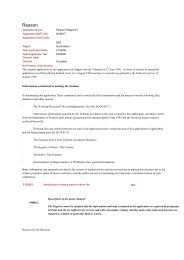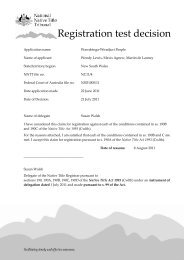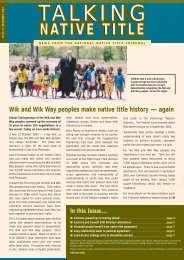Issue 10 - National Native Title Tribunal
Issue 10 - National Native Title Tribunal
Issue 10 - National Native Title Tribunal
- No tags were found...
Create successful ePaper yourself
Turn your PDF publications into a flip-book with our unique Google optimized e-Paper software.
Pipeline accord brings ninetraditional owner groupstogetherThe construction of a 390-kilometre gaspipeline between Moranbah in centralQueensland and Townsville will getunder way this month following thefinalisation late last year of threeindigenous land use agreements (ILUAs).The ILUAs—agreed between nine traditionalowner groups along the path of the pipelinearound the Bowen Basin and the NorthQueensland Gas Pipeline Project—wereregistered with the <strong>Tribunal</strong> in Decemberafter 14 months of negotiations.The nine groups include the Barada BarnaKabalbara and Yetimarla, Wiri, the InlandNebo Group, Jangga, Birri, Kudjala, Juru,Bindal, and Wulgurukaba peoples.At a celebration event in Townsville on 21January, pipeline project representative MrPaul Maloney thanked the traditional ownergroups for their ‘constant commitment tothe negotiations’.‘The project ispleased withthe positiveoutcome for allparticipants,’ hesaid.Traditional owner negotiators said theagreements showed ‘what Aboriginal peopleand developers can do when they sit downtogether and negotiate directly with eachother’.One of the outcomes of the negotiation wasa separate cultural heritage managementplan that requires all workers on the projectto undertake induction training about thenine traditional owner groups. Allconstruction workers will view a video inwhich elders explain the need for respect fortraditional land and country.<strong>Tribunal</strong> member Mr Graham Fletcher, whoassisted the groups with the ILUA processThe traditional owners’ combined negotiatingteam, Enertrade joint venture team and <strong>Tribunal</strong>representatives meet in Townsville to formalisethe three indigenous land use agreements.and development of the plan, said theagreements provided social and economicbenefits for the traditional owners andassurances that cultural heritage would notbe adversely affected by the pipeline’sconstruction.‘By working together cooperatively thegroups have developed relationships thatcan be built upon in the future,’ he said.Regional heritage agreementsto help reduce WA backlogAboriginal, mining and governmentrepresentatives in Western Australiahave reached regional agreements tohelp to reduce the backlog of miningtenement applications in the state whileensuring respect and protection forAboriginal heritage.The agreements are the result of thecollaborative approach of the HeritageProtection Working Group (HPWG) whichwas set up by the WA Government in July2002 in response to recommendations ofthe government’s Technical Taskforce onMineral Tenements and Land <strong>Title</strong>Applications.The taskforce released a report in November2001 identifying how the backlog ofmineral tenements and land titleapplications could be dealt with moreefficiently while protecting Indigenouspeople’s native title rights.<strong>Tribunal</strong> member Mr Bardy McFarlanefacilitated the Heritage Protection WorkingGroup which comprised representatives ofthe mining industry, native titlerepresentative bodies and stategovernment agencies.The <strong>Tribunal</strong> convened more than <strong>10</strong>0negotiation meetings, and agreements arenow in place in the Goldfields and SouthWest regions. An agreement has also beenreached in the Yamatji and Pilbara regions,with individual native title claimantgroups to be consulted before it isfinalised.Mr McFarlane said an agreement was closeto finalisation in the Ngaanyatjarra regionand discussions were still ongoing in theKimberley region.‘I acknowledge and congratulate the nativetitle representative bodies, miningindustry and the state government for theirperseverance in working together to tacklethese complex issues and producingworkable solutions,’ Mr McFarlane said.Buildingrespectfor culturalheritageMs Christine George, a Wulgurukaba womanfrom Magnetic Island off Townsville in northQueensland, has been appointed culturalheritage induction trainer for the NorthQueensland Gas Project. This meanstraining every worker on the project aboutthe importance of respecting the traditionalcountry of the nine Indigenous groups alongthe pipeline.‘The information (being presented) has to bethe correct information about artefacts andsignificant sites and the cultural landscape,’she said. ‘I’m confident that people willrespect the information they receive.‘It’s the law now and the cultural heritagemanagement plan outlines what willhappen to staff who disregard it. (Workers)have to develop that respect for all thecultural heritage issues.’As part of the agreed cultural heritage plan,Aboriginal monitors will be working alongthe pipeline to ensure sites are respected andprotected.page 6


